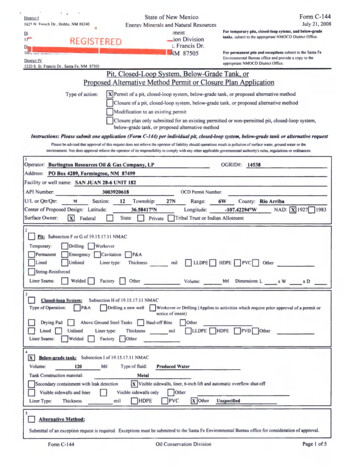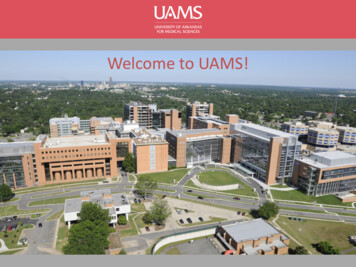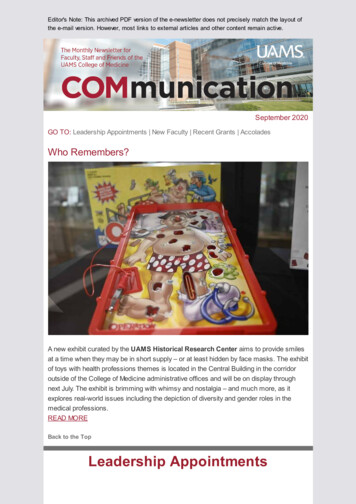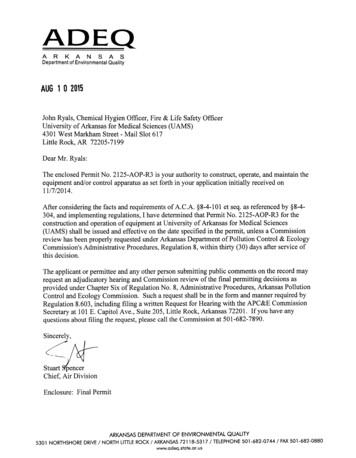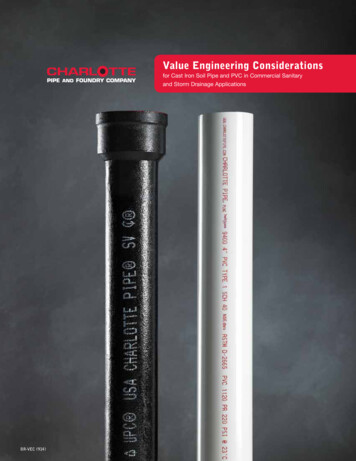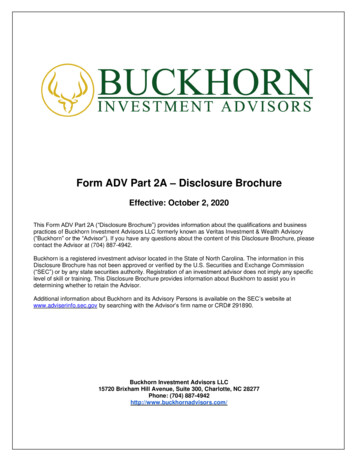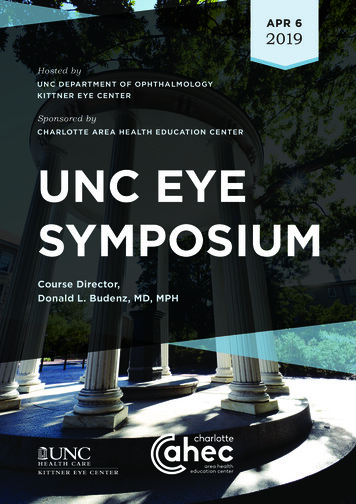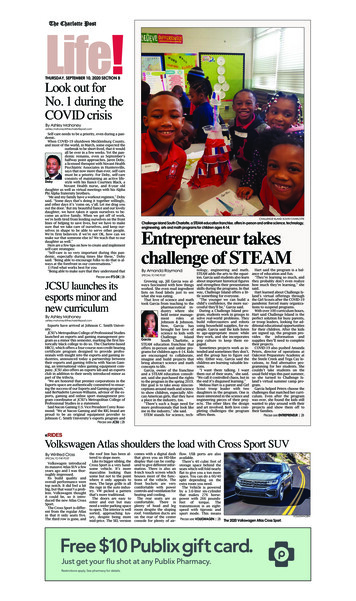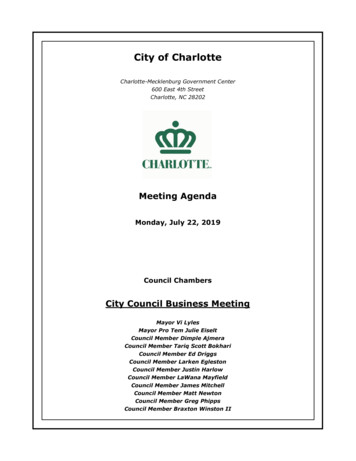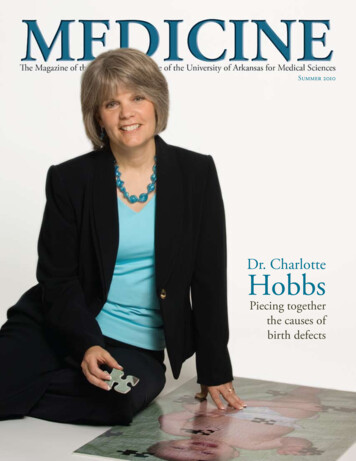
Transcription
Summer 2010Dr. CharlotteHobbsPiecing togetherthe causes ofbirth defects
Summer 2010Volume 8, Issue 1In This Issue:26So Many QuestionsBirth defects researcher Charlotte Hobbsbelieves that answers to the most bafflingcongenital disorders can be found61020Genetics Comes of AgeDrs. Bradley Schaefer and Kent McKelveyusher in a new era of genetics care andexpertise at UAMSUniversity of Arkansas MedicineThe magazine of the College of Medicine at theUniversity of Arkansas for Medical SciencesUnder the UmbrellaDean and Vice ChancellorDebra H. Fiser, M.D.A 19.9 million grant and comprehensiveCenter for Clinical and TranslationalResearch are helping UAMS speed thetranslation of scienceEditorTamara RobinsonGraphic DesignerMindy StoutHall of FameThe COM honors an alumnus whoshaped the world’s understanding ofosteoporosis and a faculty member who’sremembered as a towering figure ininternal medicine24In Every Issue:14New & Leaders16Endowed Chairs &Professorships18Students & Housestaff19Philanthropy22Alumni24Looking Back10PhotographyJohnpaul JonesOffice of Communications and MarketingPat Torvestad, Vice ChancellorLeslie Taylor, Associate Vice ChancellorTim Irby, Assistant Vice ChancellorEditorial BoardPaula Anderson, M.D.; R. Whit Hall, M.D.;Larry G. Johnson, M.D.; Judith McClain;Bobby McGehee, Ph.D.; Michele Moss,M.D.; Sudhir Shah, M.D.; G. Richard Smith,M.D.; Leslie Taylor; Jeanne Wei, M.D., Ph.D.;Paul Wendel, M.D.; Kent Westbrook, M.D.;Richard Wheeler, M.D.University of Arkansas Medicine is publishedperiodically by the Office of the Dean andVice Chancellor in cooperation with theUAMS Office of Communications andMarketing. UAMS is an affirmative action,equal opportunity institution. For informationor permission to reprint any portion of thismagazine, please call (501) 526-5163.UAMS is a HIPAA compliant institution. Toopt out of future development mailings,call (501) 686-8200. 2010 UAMSOn the cover: Charlotte Hobbs, M.D., Ph.D., is aprofessor and chief of the Birth Defects Research Sectionin the College of Medicine’s Department of Pediatrics anddirector of the Arkansas Center for Birth Defects Researchand Prevention. She has received more than 37 million ingrants and state appropriations for birth defects research,surveillance and prevention activities since 1996. Hobbshas dedicated her career to solving some of medical science’stoughest puzzles. Our profile starts on page 2.2We welcome your commentsSend us your thoughts, story ideas andconcerns. Contact Tamara Robinson at (501)526-5163; by e-mail: tlrobinson@uams.edu; ormail to: College of Medicine,4301 W. Markham St., #550-1,Little Rock, AR 72205-7199.
MedicineFa s t Tr a c kon theYou may be astounded, as I am, at the incredible paceof change in medicine today. Not so many yearsago we marveled that the world’s entire biomedicalknowledge was said to be doubling every two decades. Today,some contend that it is doubling in half that time – or less.Our researchers and clinicians are on the forefront of thisrapidly changing biomedical landscape.Charlotte Hobbs, M.D., Ph.D., featured in our coverstory (starting on page 2), is one of the nation’s leadingbirth defects researchers. She and fellow investigators areturning their attention to new fields of exploration – suchas epigenetics, the study of changes in gene expression due to non-genetic factors – tounravel the causes of birth defects.At the same time, Dr. Hobbs notes that the search for new discoveries and bettermedical care is a long and continuous journey. Much is learned every day, and yet there’sso much more to learn. Dr. Hobbs and colleagues at the Arkansas Children’s HospitalResearch Institute have begun recruiting participants in Benton County for the nation’slargest-ever study of children’s health, a massive endeavor that will track children acrossthe country from before birth through age 21.Meanwhile, the avalanche of new knowledge about genetics is changing clinicalmedicine (and medical education) forever. Bradley Schaefer, M.D., the founding directorof the College of Medicine’s Division of Genetics, has his hands full. As you’ll read inour feature (starting on page 6), Dr. Schaefer is launching UAMS’ Personalized MedicineClinic, which will use genetic analysis to help tailor medical planning and treatment forindividual patients.Last fall, he and Kent McKelvey, M.D., opened UAMS’ Adult Genetics Clinic. Becauseof advances in the understanding of Down syndrome and other disorders, patients withmany conditions are living longer – making the adult clinic and its expertise more vital.Moving discoveries into actual medical practice and improving health is what it’s allabout, of course. This July we’ll complete the first year of work under UAMS’ largestever research grant – a 19.9 million Clinical and Translational Science Award (CTSA).The grant (see page 10) places UAMS in an elite consortium of the nation’s top researchinstitutions and is helping us to pick up the pace of translational research.Enjoy this issue!Debra H. Fiser, M.D.Dean, College of MedicineVice Chancellor, UAMS
Lifelong inquisitiveness led toa multifaceted educational andcareer journey for researcher andpediatrician Charlotte Hobbs.2 UAMS College of Medicine
“I hope that our work,along with that of otherscientists throughoutthe world, will lead tonew discoveriesthat will reduce thenumbers of babies borndefects.”SQuestions o manywithBut birth defects researcher Charlotte Hobbs believes that answers to the mostbaffling congenital disorders can be found.Charlotte Hobbs, M.D., Ph.D., was achild in Ontario, Canada, in the 1960swhen scientists first linked folate deficiency inpregnancy with neural tube defects. It would take30 years of additional research, however, beforefolate recommendations were issued for women,foods began to be fortified with folic acid, andmassive educational campaigns vastly reduced theincidence of neural tube defects.“We’ve gained some knowledge fromresearchers who came before us, but we have notyet identified the causes of most birth defects,”said Hobbs, a professor and chief of the BirthDefects Research Section in the College ofMedicine Department of Pediatrics.Some birth defects are caused by a singlegene or chromosomal abnormality, or a specificteratogen, Hobbs explained. However, about 70percent are due to a complex interaction betweenenvironmental exposures, lifestyle choices, andgenomic and epigenomic susceptibilities.“Because it can take such a long time toidentify causes, there has to be a strong beliefthat the causes can be found,” Hobbs said.“Fortunately, recent advances in genomics andepigenomics allow us to look into the black boxof causes with new tools.”And that’s what keeps Hobbs going. “I stronglybelieve that there are causes that are yet to befound,” she said. “I hope that our work, alongwith that of other scientists throughout theworld, will lead to new discoveries that willreduce the numbers of babies born with defects.”One in every 33 babies in the United States isborn with a defect. In Arkansas, a baby is bornwith a birth defect every five hours, and everyfour days, a baby dies because of a birth defect.Hobbs, who trained as an epidemiologist aswell as a physician, is director of the ArkansasCenter for Birth Defects Research and Prevention– one of the nation’s leading centers – andscientific director of the Arkansas UAMS College of Medicine 3
Reproductive Health Monitoring System. Since joiningthe faculty in 1996, she has been awarded more than 37 million in competitive research funds and stateappropriations for research, comprehensive surveillance ofbirth defects in Arkansas and prevention activities.Major New Study Hopes to Shed LightThis year, Hobbs and her colleagues are gearing up forthe largest ever investigation of child health in the UnitedStates – the congressionally mandated National Children’sStudy (NCS). Funded by the National Institutes of Health,the study will track more than 100,000 children at 105sites across the country from pre-birth to age 21 to learnmore about the causes and effects of many childhooddiseases and how both genetics and the environmentimpact children’s health and development. It is hopedthat the study will shed significant light on majorhealth issues such as the rising prevalence of autismand prematurity rates.Benton County in northwestern Arkansas is one of105 selected sites for the NCS. Hobbs is the principalinvestigator of a 14.4 million, five-year grant awardedto the Arkansas Children’s Hospital Research Institute in2008 to fund Arkansas’ participation in the initial phaseof the study. Jim Robbins, Ph.D., a professor of pediatricsin the College of Medicine (and, incidentally, Hobbs’husband) is serving as the local site investigator.This summer, in collaboration with Benton Countyobstetrical care providers, Hobbs and Robbins will lead ateam of UAMS investigators in the launch of a pilot studyto evaluate a novel recruitment method for potential NCSparticipants. UAMS will be joined by nine universities,including Yale, in the nine-month pilot project.One of the earliest cohort studies nationwide will explorethe impact of glucose metabolism imbalance on adversepregnancy outcomes. Hobbs proposed this particular studywhile serving as the non-federal co-chair of the workinggroup that designed the birth defects-related componentsof the overall study in 2001 through 2004.On the ForefrontHobbs’ achievements as director of Arkansas Centerfor Birth Defects Research and Prevention demonstrate4 UAMS College of Medicinewhy she was selected to co-chair the working group forthe new study. The center is highly regarded among thenine programs of its kind funded by the U.S. Centersfor Disease Control and Prevention (CDC). The centersparticipate in the National Birth Defects Prevention Study,an earlier and continuing effort focused on congenitaldisorders. Hobbs is an active member of the geneticanalyses workgroup and holds many other roles. TheArkansas center has the highest rates of participation ofmothers in the CDC’s national case-controlled studies andis one of the first sites to engage in genomics research usingsamples from the national study.The centers also conduct birth defects surveillance andindependent research activities.First funded in late 1997, the Arkansas center hasbeen renewed for two additional five-year grant periods.Hobbs had just finished her pediatrics residency at UAMSand joined the faculty as an assistant professor when shebegan working on the initial grant. By then, her lifelonginquisitiveness and interest in health and science alreadyhad drawn her into a multi-faceted educational andcareer journey.She’s Always Asked “Why?”“I loved the sciences and math when I was growing up,”Hobbs said. “I loved asking questions. I’ve always beenvery analytical and wanted to understand why things werea certain way.” She also wondered why some children wereborn with birth defects while others are not. Her ownmother had been treated for an abdominal wall defect atbirth and had suffered through a stillborn death in her firstpregnancy and two later miscarriages.Hobbs graduated from Carleton University in Ottawawith distinction in psychology in 1978. After earninga master’s degree in human communication disordersat McGill University in Montreal in 1981, she beganworking with children who were hearing impaired or hadother disabilities that interfered with communication.“But that left me with more questions than answers, in away,” Hobbs said, explaining her decision to train as anepidemiologist in 1988.While working toward a doctoral degree at McGill,Hobbs realized how much she also wanted to practiceclinically as a physician. After being accepted at 10 medical
schools, she decided to attend McMaster University inHamilton, Ontario, because it was in the forefront ofclinical epidemiology and evidence-based medicine, whichare essential building blocks for translational research.Hobbs completed her doctoral dissertation while attendingmedical school. She received her doctoral degree inepidemiology and biostatistics in 1991 and her medicaldegree a year later.Building a Future in ArkansasHobbs met Jim Robbins, a Little Rock native andprofessor of medical sociology and psychiatry,while at McGill, and the couplemarried the year that she graduatedfrom medical school. Hobbs decidedto specialize in pediatrics, and afterinterviewing for residency in severalprograms – including Duke and BostonChildren’s Hospital – the couple decidedthat UAMS and Arkansas Children’sHospital (ACH) were ideal for both of them.Robbins joined the Pediatrics faculty and Hobbs startedher residency in 1993.Their first child, Benjamin, was born in 1995, andtwins Samuel and Emma followed in 1997. That alsowas the year that the Arkansas Center for Birth DefectsResearch and Prevention received its initial funding, withHobbs serving as co-director alongside Pat Casey, M.D., alongtime faculty member. In 2001 Hobbs was named chiefof the Birth Defects Research Section of the Departmentof Pediatrics.In 2002, the center was awarded a second five-yeargrant, and Hobbs, who had been promoted to associateprofessor, took the reins as director. In 2004, Hobbs wasinvested as the Pamela D. Stephens Endowed Chair forBirth Defects Research at ACH. In 2008, she receivedthe UAMS College of Medicine’s Distinguished FacultyScholar Award.Hobbs has been a member of the Neonatology Sectionin the Department of Pediatrics since joining the faculty.“I love caring for newborns and being part of a neonatalteam,” she said. “When I attend deliveries of babies whoare born with birth defects or other neonatal problems, mypassion to continue our research tasks is renewed.”The Search Goes OnHobbs’ reputation as a world-class birth defectsresearcher has grown over the years through her leadershipin the National Birth Defects Prevention Study, theNational Children’s Study’s birth defects working group,and other activities. Since 2005, she also has served on theNational March of Dimes Scientific Advisory Committeeon Prematurity.Meanwhile, Hobbs and other researchers have madeprogress in unraveling the causes of birth defects. Amongmany findings, the National Birth Defects PreventionStudy confirmed links between maternal obesity andseveral birth defects, including spina bifida, in whichobesity doubles the risk. More also has been learned aboutthe links between smoking and congenital heart defectsand craniofacial abnormalities such as cleft lip or palate.Unfortunately, surveillance in Arkansas has shown that 28percent of mothers smoked during early pregnancy, doublethe percentage of mothers in center locations such asCalifornia, Hobbs said.Hobbs envisions a day when physicians will have acadre of tests that can check for biomarkers that revealthe risk for birth defects prior to conception. She and hercolleagues are exploring possible links between oxidativestress and congenital heart defects. They have found thatwomen who have had babies with congenital heart defectshad higher levels of homocysteine in their blood, andthe researchers are continuing to look at metabolites,common genetic variants and possible epigenetic factors,which involve changes in gene expression due to nongenetic factors.“I think one of our most rewarding, lifelongresponsibilities is to use our talents, skills and resourcesto find new ways to improve the wellbeing of all people,”Hobbs said. “As a clinician-scientist investigating causesof birth defects, I feel privileged to be able to combine mymedical skills and knowledge with rigorous epidemiologicalmethods to discover new ways to improve the health of ourchildren and those of future generations.” UAMS College of Medicine 5
Division of Genetics DirectorBradley Schaefer, M.D.(standing at back) and KentMcKelvey, M.D., reviewgenetic studies.6 UAMS College of Medicine
AgeGeneticscomes ofDrs. Bradley Schaefer & Kent McKelveyusher in a new era of genetics care andexpertise at UAMSKaren Jobe brought a long checklist to her22-year-old son John’s first visit with BradleySchaefer, M.D., at UAMS’ new AdultGenetics Clinic. She had grown accustomed to havingto explain things to health care providers over the years.My son has Rubenstein-Taybi syndrome. Here’s what weneed to look for.But Schaefer, director of the Division of Genetics inthe College of Medicine, understood the Little Rockmother’s concerns and the nuances of John’srare genetic condition. He had a list of additionalthings that warranted testing inJohn’s case.“I felt so relieved,” Karen Jobesaid. “This clinic came along at justthe right time for us.”The clinic opened last August at Freeway MedicalTower in Little Rock, ushering in a new era of carefor Arkansans with Down syndrome and hundredsof other genetic conditions. Headed by Schaefer andKent McKelvey, M.D., the clinic serves adolescents andadults, including those who were cared for at ArkansasChildren’s Hospital (ACH) in their youth. It is one ofonly a handful of programs in the nation devoted tothe care of adults with genetic disorders.With the flood of new knowledge about the geneticlinks to health, it’s not surprising that the clinic is justone of several areas of focus for Schaefer, whojoined the UAMS faculty as the founding director ofthe Division of Genetics in July 2008. The divisionprovides adult clinical care, lends genetics expertise toresearch on campus, and coordinates genetics educationin the College ofMedicine.Schaefer alsoserves as chief of theDivision of Geneticsand Metabolism inthe Collegeof Medicine’sDepartment of Pediatrics at ACHand as medical director of the genetics counselingtraining program in the UAMS College of HealthRelated Professions.Get Ready for Personalized Medicine“We want Arkansans to have the very best geneticsprogram available anywhere,” said Schaefer. “Ourultimate vision is that there won’t be a person inArkansas who doesn’t have access to state-of-the-artservices in genetics.”Those services will include a cutting-edgePersonalized Medicine Clinic in the near future,Schaefer said. Personalized medicine is an emergingspecialty that uses genetic analysis to tailor medicalcare for a specific patient. It can help predict one’ssusceptibility to disease or how a patient will respondto a particular medication. Personalized medicine UAMS College of Medicine 7
services can help determine what a patient should do tostay healthy and much more.“The potential is tremendous,” said Schaefer. “Geneticanalysis and personalized medicine can be an amazing tool,but it must be handled appropriately. Nowadays people canactually order certain genetic tests online, but the reportthat they get back doesn’t help them at all with the issue ofhow to interpret the information or what to do with it.”He said the clinic will offer a three-step approach. “Wewill meet with patients and obtain thorough informationabout their family history and their concerns, and we’llhelp them understand what the testing can and cannot do,”he said. “Then we’ll conduct the tests. Finally, and mostimportantly, we’ll make sure our patients understand theresults and give our expert recommendations for makingthe most of the information.”It’s Not Star TrekSchaefer plans to launch a wide array of other specializedgenetics clinics in partnership with UAMS physiciansin other disciplines. He already has initiated one, inconjunction with the Harvey & Bernice Jones EyeInstitute, for patients with genetic-based retinal disease.He is working with other UAMS leaders on psychiatricgenetics and cardiac-genetics programs. Neurogenetics andother areas are being explored.“Discipline by discipline, the genetic aspects of amultitude of conditions really are a part of day-to-daymedicine,” Schaefer said. “It’s not ‘Star Trek.’ It’s here andnow, and we’re working to make sure that every medicalresident and medical student has a solid understandingof genetics.”“I play a game with first-year medical students that Icall ‘Stump the
UAMS is a HIPAA compliant institution. To opt out of future development mailings, call (501) 686-8200. 2010 UAMS We welcome your comments Send us your thoughts, story ideas and concerns. Contact Tamara Robinson at (501) 526-5163; by e-mail: tlrobinson@uams.edu; or mail to: College of M
